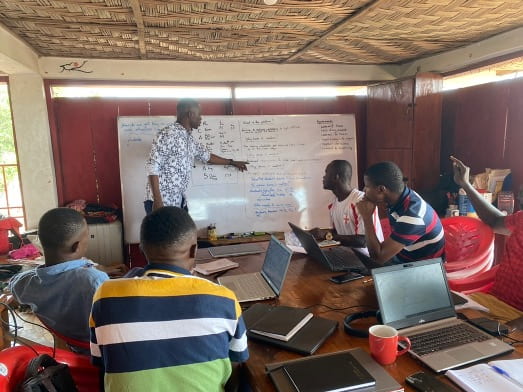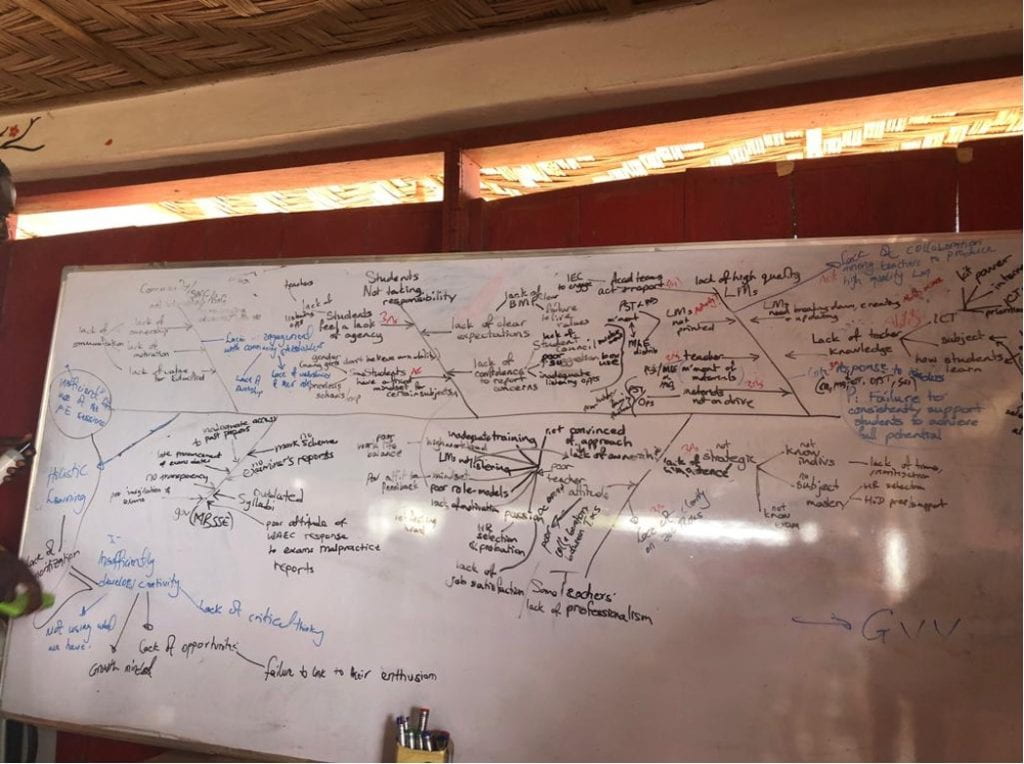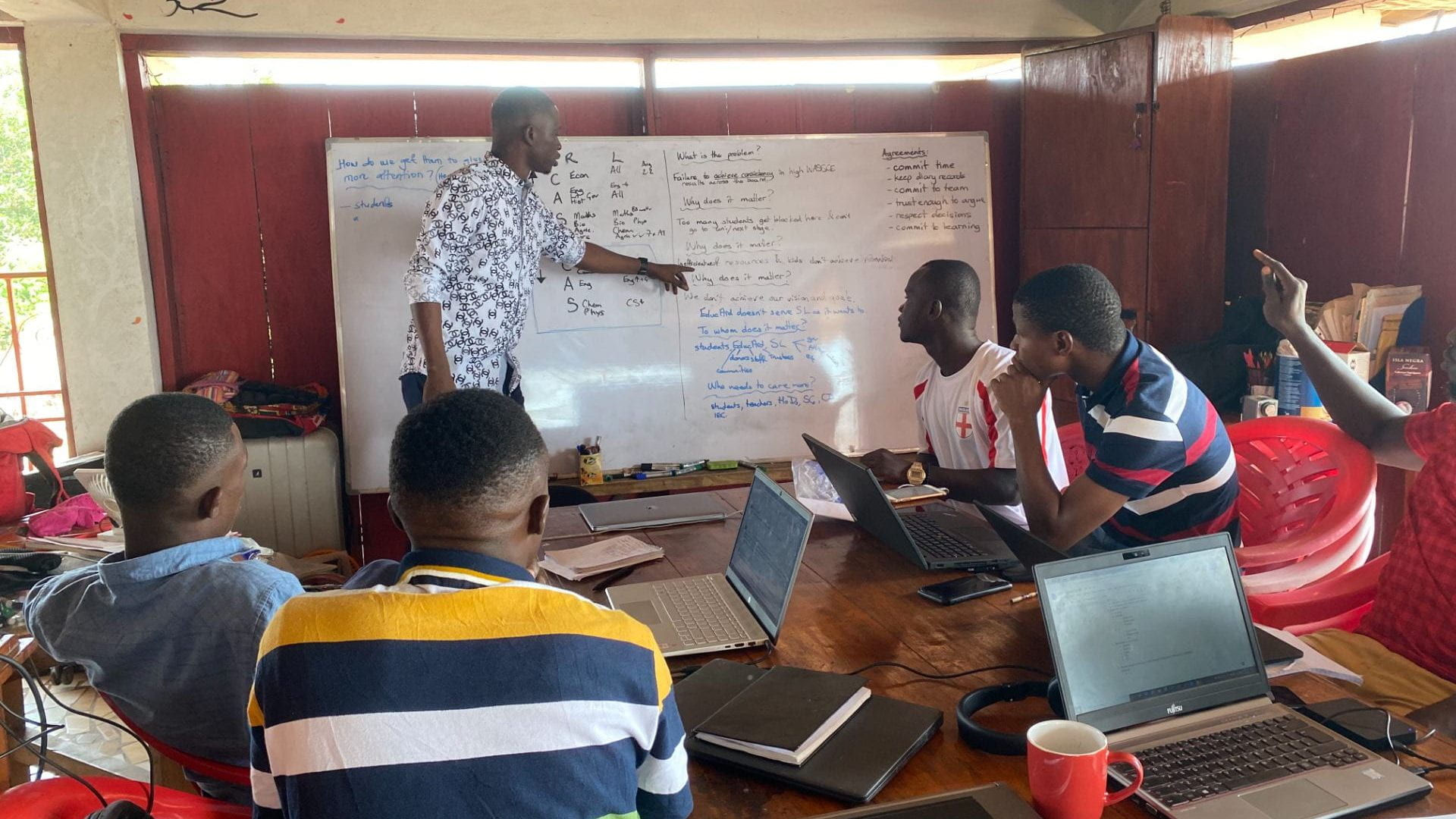Guest blog by Zacharia Bangura, Foday C Kalokoh, Kabiru Mansaray, Miriam Mason, Ibrahim Kanu, Rugiatu Alimatu Kamara
This has been a real learning journey, where there are opportunities to test theories and put them into practice, review and revise, try again and after as many iterations as needed to get set for scale up.
Small is beautiful
In the course materials, there are many useful tools to help structure an approach for tackling problems, to work step by step and acknowledge small achievements & small opportunities to start having an impact.
Together we can
It becomes clearer and clearer as the journey goes on that teamwork is crucial, particularly with government if there is to be sustainability. It is absolutely vital to listen to multiple perspectives and then come together to do the work. One perspective won’t be sufficient. One actor alone cannot begin to tackle the complexity of the issues under review
Let the love flow
Where there is no relationship, no communication, no trust, there will be no progress. Working in development is a human activity and requires the building of trustworthy relationships with the authoriser(s) and the team and key stakeholders and keeping the communication flowing about each step in the process.
A complex problem needs careful and structured deconstruction and reconstruction

Constructing the problem – why does this matter?
For 12 weeks, the Port Loko combined team of EducAid and three representatives of the Ministry of Education & local government worked to explore the various factors contributing to under-performance in foundational literacy and numeracy in schools across the Port Loko district.

Deconstructing the problem – exploring the complexities opens up possibilities
Through the use of the Ishikawa diagram, we were able to explore some of the deeper complexities of this issue. On the face of it, the problem is poor teaching. When one gets under the skin of the issue, one realises that there are many contributing factors and that simply training teachers in better FLN pedagogies will still not solve the problem. There are numerous additional concerns such as the lack of focus on the particular needs of girls within the system, the complete failure to engage parents and community members around their own responsibilities to the school’s success, the limited strength and clarity of the School Quality Assurance Officers (SQAOs) on how to stand firm against the pressures towards corruption, the limited knowledge of most schools of how to positively manage student behaviour resulting in antagonistic relationships and poor attendance, and so on.
As we explored these issues in greater depth, through discussions with students, teachers, school leaders and so on, trying to take a more curious than judgmental approach, our understanding grew of a. What the real problems are and b. Where the opportunities for hope and for action are.
A complex problem presents many small entry points.
Through an exploration of some positively deviant examples of schools managing behaviour very differently with consequently much higher attendance and student performance, it was possible to identify opportunities for looking at ways of supporting schools to change their own approaches. In further discussions exploring school leaders and students’ responses to the possibility of trialling these interventions, we heard stories of real concern particularly from female students who had experienced significant punishment when they had resisted the pressure to give sex for grades etc. This highlighted not only the urgent need to actually introduce respectful and positive behaviour management but also the urgent need for better clarity on how and what to report in terms of child protection incidents too.
Through an exploration of good practice used elsewhere in Sub-Saharan Africa, it was possible to identify ways in which the SQAOs might be supported to make better, more ethical decisions and hold schools and school leaders to account more effectively. Discussions with the SQAOs in question were initially a bit tense, with them feeling accused and judged. As a result of a few more curious and open discussions, a better understanding was established and when the day came for the first ‘Giving Voice to Values’ session, it seemed to be warmly welcomed and everybody appeared enthusiastic about the learning opportunity. Our authoriser supported and joined in, giving additional weight and status to the event.
While 12 weeks has not been enough time to completely address such a massively complex problem, the whole team is now convinced that a. One does not have to be able to immediately address everything in order to be able to tackle something; b. Because the problem is complex, there are many small openings that can be exploited. Using the triple A analysis (do we have authority, ability and acceptance? and building them where we have not!), small entry points can be identified and exploited building confidence that the bigger and more seemingly intransigent problem may be broken down into small and manageable pieces.
We are starting to trial small things with a view to reviewing and revising and then having a story to tell so that we can have an influence on resource allocation in the future. The needs are great within the country and in particular this district which is one of the lowest performing districts in Sierra Leone. It matters that when resources are allocated here, they are well-used.

The first meeting with the SQAOs to explore the ‘Giving Voice to Values’ materials together was well-received.
This approach is going to help us solve complex individual and societal problems more effectively by making sure that we always construct a problem that really matters and is persuasive, understand the root causes, engage with different people, take small steps and continue to learn.
Some of the most powerful concepts:
- I don’t like him very much. I must get to know him better.
- Approach curiosity.
- You don’t have to buy the idea. Just rent it for now.
Where to find good ideas:
- Latent practice
- External best practice
- Positive deviants
- Existing practice
- Your team is your gift
After initial trials and further iterations over the next few weeks, the team expects to be able to tell the story to the Ministry of Education centrally and show how these and other opportunities are available to take significant transformative actions as key to solving the under-performance challenges which are blocking the future of so many children.
Breaking the problem down into its component parts opened the way for numerous smaller interventions and actions that little by little will undermine the stronghold that this problem seems to have over so many schools, teachers and children. One iterative step at a time, this problem can be overcome!
This blog was written by the alumni of the PDIA for Education Systems Online Executive Program at the Harvard Kennedy School. 56 participants from 8 countries successfully completed this 12-week program from September – December 2022.
